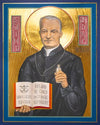Anna is one of the prophetesses mentioned in the Word of God as such. In early life, she married but we may well believe that the Lord was with her in all the commonplaces of housekeeping and household duties. The same God who afterwards gave her vocation was her Counsellor and Strength. Whenever God gives to a woman a special spiritual vocation, it will generally be found that her home life was made of God a preparation for it.
In the early Church it was one of the necessities for the office of a Bishop that he should be "one that ruleth well his own house, having his children in subjection with all gravity; for if a man know not how to rule his own house, how shall he take care of the Church of God?" (1Ti 3:4-5) With how much more reason must a woman, whose ordinary vocation is in the house, be true and faithful in little things if God is to call her to any unwonted ministry in His vineyard!
Anna's married life was short-only seven years-and then came the deepest blow of all to the heart of a woman, and especially a Jewish woman-
Sorrow hardens those who live a selfish life. They give themselves up to self"pity, bemoaning their lot, looking upon their God as hard, and jealously envying what seems the happier lot of others. But a widow who has accepted the Lord her God as her stay is perhaps one of the happiest, one of the most useful, one of the most gracious of God's creatures.
Anna's vocation was that of prayer. "She was a widow of about fourscore and four years, which departed not from the temple, but served God with fastings and prayers night and day."
"What a dull life!" some young person might say, and seen from the outside it might seem so; but those who looked on the face of the aged prophetess would see nothing monotonous there. Living continually face to face with God, drinking in perpetually the thoughts which He would impart to her, losing the narrowness of self"interest and absorbed in the continually widened interests which God would make known to her as she was able to bear them-there must have been a light upon the countenance of Anna which was a study in itself, for God and heaven shone there.
There are few who could be fitted for a vocation such as this-only those who understand that "a living sacrifice" means
During the temple services, Anna would have no pre"eminent place, but in some quiet corner, when the praises of the priests and Levites were going up to heaven, this still woman would be praying, and bearing up every worshipper upon her heart. When the children were brought into the temple that they might be presented to the Lord, the dedication of the parents would be buoyed up by the prayers of Anna. If Jerusalem were visited with a pestilence, perhaps no other had more to do than Anna with its removal, for she would bear upon her heart the sin of her people which God was rebuking, and would take case after case of those who were smitten, and inquire of the Lord concerning them. She was at home with those who were unworldly; she was not to be found at feasts or in worldly gatherings; but wherever there was a need for God, wherever there was a cry after God, there Anna found admission; it was just there that prayer was needed.
Surely it was no accident that brought her into the temple just when the Spirit of the Lord guided Simeon thither, and the parents of the Lord Jesus had brought Him, as an infant, "to do for Him after the custom of the law." The same instinct from on high which gave Simeon to see in Him the Lord's Christ, led Anna to "give thanks likewise unto the Lord." She, too, recognized her Redeemer "and to all that looked for redemption in Jerusalem." (Luke 2:38.)
It may be, she was a woman of few words; most people who pray intensely are so. But when she did speak, her one theme was Himself, and she knew who would understand her. Probably the majority of the population of Jerusalem did not know even of her existence, but Anna knew all those "who looked for redemption in Jerusalem," and probably, those in the hill country of Judea who laid up in their hearts all that was revealed concerning the vocation of John the Baptist. This little company, with their eyes upon the coming King, and the coming Kingdom, lived in an atmosphere contrary to the world of their day. Herod and Jerusalem "were troubled" at the birth of Jesus: Anna's whole soul was filled with adoration for it; the aged intercessor saw the answer to her prayers.




















